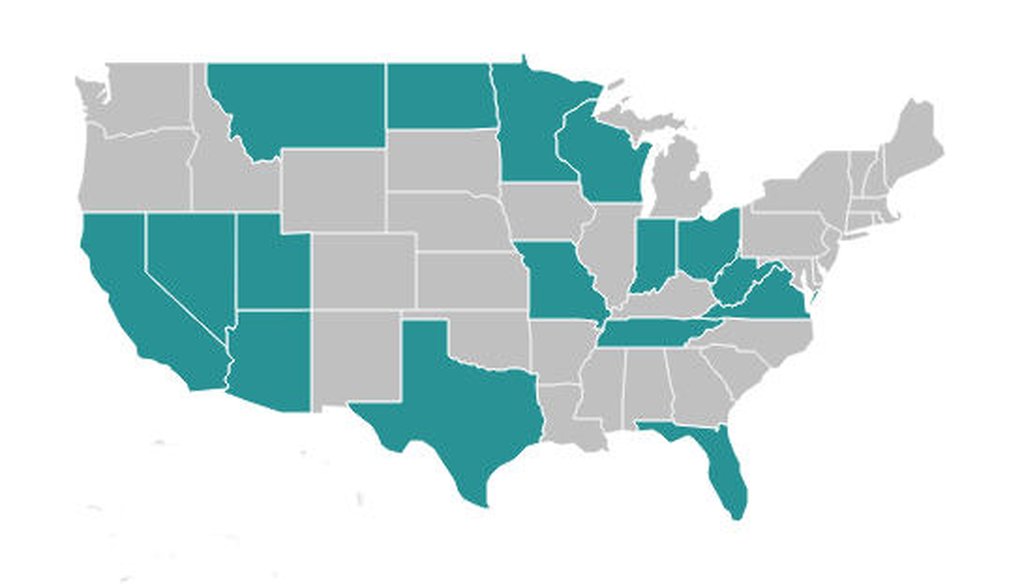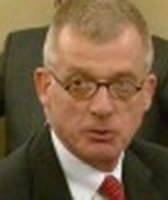Get PolitiFact in your inbox.

Here are the 16 states we're paying special attention to in the 2018 midterm elections. Hear something that needs a fact-check? Email us at [email protected].
Arizona
Likely candidates: Open seat; primary is Aug. 28
The top Republican contenders to replace retiring U.S. Sen. Jeff Flake are U.S. Rep. Martha McSally, former Arizona state Sen. Kelli Ward and former Maricopa County Sheriff Joe Arpaio. On the Democratic side, U.S. Rep. Kyrsten Sinema is the frontrunner.
Republican contenders McSally, Arpaio, and Ward are aligning themselves with President Donald Trump and making support for border security a top issue. In August 2017, before Flake’s announcement, Trump tweeted that it was "great to see" Ward running against Flake. Arpaio, whom Trump pardoned over a federal conviction based on his immigration practices as sheriff, officially entered the race in January. McSally also joined the Senate race in January. She was first elected to the House in 2014 and represents Arizona’s 2nd Congressional District. A former Air Force combat pilot, McSally serves on the Armed Services Committee and chairs the Homeland Security Committee’s Border and Maritime Security Subcommittee.
Sinema represents Arizona’s 9th Congressional District and was first elected to the House in 2012. Sinema serves on the Financial Services Committee.
While polling data show McSally in the lead for the Republican primary, polls favor Sinema in challenges against McSally, Ward or Arpaio in the November general election. Sinema’s most competitive scenario is against McSally, polls suggest.
Fact-checks:
Ward: "Says Rep. Martha McSally "is a #FlipFlopBorderHawk." Half True
Arizona Democratic Party: "Congresswoman Martha McSally voted to let companies sell your internet data to the highest bidder without your consent. Then she got paid $42,000 by the very corporations she allowed to sell your personal info." Mostly False
California
Candidates: Democratic incumbent Dianne Feinstein vs. Democratic challenger State Sen. Kevin de León
Feinstein, 85, was first elected to the U.S. Senate in 1992 after a failed gubernatorial run in 1990. She is known nationally as a strong gun control advocate. She authored the 1994 federal assault weapons ban which expired a decade later. Feinstein was mayor of San Francisco from 1978 to 1988.
State Sen. Kevin de León, 51, was elected to the California State Assembly in 2006. Four years later he was elected to the State Senate. He became the State Senate Leader in 2014.
Two Democrats are squaring off in November due to California’s ‘top-two’ primary system, in which voters select the top two candidates regardless of party affiliation. De León won the endorsement of the California Democratic Party in July 2018 and is considered more liberal than Feinstein. A poll the same month, however, showed Feinstein with a 22 percentage point lead over De León.
Fact-checks:
De León: Clean energy employs "more than half a million Californians. That’s nearly ten times more the number of coal mining jobs that exist in the entire nation." Mostly True
Feinstein: "Teachers spend $1.6 BILLION per year on school supplies. The Republican tax bill ELIMINATES their ability to deduct those expenses." Half True
Florida
Candidates: Democratic incumbent Sen. Bill Nelson vs. Republican Gov. Rick Scott
Nelson was elected to the U.S. Senate in 2000 and has been a familiar fixture of Florida politics for decades and is now the only statewide Democratic officer holder. Before serving in the Senate, Nelson was a member of the U.S. House of Representatives from 1979-1990. Nelson’s long history as a lawmaker is why Scott criticizes him for being a career politician. Nelson’s supporters, however, pushed back on that characterization — claiming that Nelson is actually one Florida’s most independent senators. (Half True.)
Scott is the two-term incumbent governor of Florida. When he announced his bid for Senate, he promised to shake up Washington and enact congressional term limits and has emphasized his promise, largely fulfilled, to create 700,000 jobs in 7 years. Scott is also known for his prior tenure as CEO of Columbia/HCA, a hospital company, where he quit in 1997 shortly after federal agents went public with an investigation into the company that later led to a $1.7 billion fine for Medicare fraud.
Florida has a history of tight statewide elections in a swing state. The Florida Senate race is expected to be one of the most expensive Senate races in the nation.
Fact-checks:
Scott: Says Sen. Bill Nelson "voted for higher taxes" 349 times. False
Nelson: Says he "actually wrote the bipartisan law that makes it illegal to drill off Florida’s coast." Mostly True
Republican Party of Florida: "Out of 860 bills (Sen. Bill Nelson has) introduced in Congress, only 10 have passed." Mostly False
Indiana
Candidates: Democratic incumbent Sen. Joe Donnelly vs. Republican Mike Braun
Donnelly was elected to the Senate in 2012. He previously served three terms as a U.S. representative. Donnelly is a moderate Democrat fighting to hang onto his seat in a state Trump carried by 19 points.
Braun is a Republican state senator who beat his primary competitors by likening himself most to Trump as an outsider and businessman. Trade has become the centerpiece of the expensive ad battle between the two. Donnelly’s campaign has repeatedly attacked Braun’s auto parts distribution company, because they count foreign products among their stock and foreign companies among their manufacturers.
In return, Braun’s campaign rebuts with Donnelly’s business record. Donnelly profited from a family arts and crafts business that relied on cheap Mexican labor to produce dye for ink pads. Donnelly sold his stocks in the company following the AP report on ties to Mexico in July 2017. Donnelly narrowly trails Braun in polling.
Fact-checks:
Senate Leadership Fund: Says Donnelly’s "family got caught outsourcing jobs to Mexico, and ‘Mexico Joe’ profited up to $80,000." Mostly False
Braun: Says Luke Messer and Todd Rokita "voted to fast-track Obama’s trade deals." Half True
Minnesota
Likely candidates: Incumbent Democrat Tina Smith vs. state Sen. Karin Housley
Smith was appointed to the Senate to replace Democrat Al Franken, who resigned amid accusations of improprieties with women. She faces several Democratic contenders in the Aug. 14 primary, notably former Republican Richard Painter, who has become an outspoken critic of President Donald Trump on ethical grounds.
The Republican field isn’t officially set, either, but Housley is considered the frontrunner. The only recent poll has shown Smith leading Housley by 9 points, and it was conducted by a conservative firm, so Smith is considered the general-election favorite.
The late primary date has kept the race low-key. This is actually one of two U.S. Senate races in Minnesota in November, but the other -- the reelection bid by Democratic Sen. Amy Klobuchar -- isn’t considered competitive.
Fact-checks:
Smith: "Taking into account inflation, the federal minimum wage is actually worth less than what it was worth 50 years ago." True
Smith: "On average, American women only earn 80 cents for every dollar a man earns for doing the same job." Mostly False
 Missouri
Missouri
Likely candidates: Incumbent Democrat Claire McCaskill vs. Republican state Attorney General Josh Hawley
Both parties have contested primaries on Aug. 7, but the expected victors are McCaskill and Hawley. McCaskill was first elected in 2006, and despite Missouri increasingly becoming a red state, she won a second term in 2012 against controversial social conservative Todd Akin. Since then, McCaskill has been in Republicans’ sights.
Republicans had high hopes for Hawley, a relatively fresh face, but in his role as attorney general he was forced for several months to contend with serious allegations of impropriety swirling around fellow Republican Gov. Eric Greitens. (Greitens eventually resigned.) Meanwhile, Trump’s approval rating in the state — which he won in 2016 with 56 percent of the vote — has fallen in recent months, though it remains slightly positive, according to Morning Consult.
McCaskill will depend heavily on voters’ longstanding familiarity with her; she also has a sizable war chest to spend. She has led or been tied in all recent polls, usually in the small single digits.
Fact-checks:
Missouri Democratic Party: If a lawsuit backed by Josh Hawley succeeds, "nearly 2.5 million Missourians with pre-existing conditions could lose their health care coverage." Half True
Hawley: Says "he fought Obama at the Supreme Court — and won." Mostly True
Hawley: Says "Claire McCaskill voted for 100 percent of President Obama’s judicial nominees." Mostly True
 Montana
Montana
Candidates: Incumbent Democrat Jon Tester vs. Republican Matthew Rosendale
Tester has been a U.S. senator since 2006. He is currently ranking member on the Senate Veterans’ Affairs Committee, a particularly meaningful role given Montana’s large veteran population. Prior to becoming a U.S. senator, he served in the state Legislature, where he was president of the Montana Senate. He and his wife maintain a farm near Big Sandy.
Rosendale clinched his primary June 5 with support from former Trump White House aide and strategist Steve Bannon and financial backing from conservative groups. Rosendale, the state auditor, previously served in the state Legislature, where he was first elected in 2010. Rosendale and his wife operate a ranch near Glendive.
Limited polling data suggests the race may be a close one. As a Democratic incumbent running in a state that Trump won handily in 2016, Tester is seen as vulnerable. He personally provoked Trump’s ire by derailing White House physician Ronny Jackson’s nomination to head the Department of Veterans Affairs. Trump responded in kind by flying to a Great Falls rally in July where he blasted Tester and endorsed Rosendale.
Fact-checks:
Rosendale: Says Sen. Jon Tester "believes that we should have a national registration so that the people of Montana should have to ask permission before they purchase a gun, ask permission from the federal government." Pants on Fire
Rosendale: Says Sen. Jon Tester "took an income raise in the omnibus bill." Pants on Fire
 Nevada
Nevada
Candidates: Incumbent Republican Dean Heller vs. Democrat U.S. Rep. Jacky Rosen
Heller was elected in 2012 after being appointed by Nevada Gov. Brian Sandoval. Before that, he served three terms as U.S. Representative from Nevada’s 2nd Congressional District, and before that, three terms as secretary of state. Heller co-sponsored the last-ditch Republican effort to pass a health care bill to replace the Affordable Care Act with block grants to the states.
Rosen is a first-term representative from Nevada’s 3rd Congressional District, which extends from the southern portion of Las Vegas to many smaller communities southwest of the city. She worked as a systems analyst for CitiBank and Southwest Gas, a regional utility. She supports the Affordable Care Act and has criticized the Republican tax bill as too generous to the wealthy.
The race is considered a toss-up. Democrat Hillary Clinton won Nevada in 2016 by less than 2 percent, and while Heller is vulnerable and some polls give Rosen the edge, it is only by a slim margin.
Fact-checks:
Heller: Says Jacky Rosen promised "to repeal middle-class tax cut." Mostly False
Rosen: Says Dean Heller helped "craft a partisan repeal bill that also would have slashed coverage protections for people with pre-existing conditions." Half True
Rosen: Says Dean Heller "has voted for a GOP bill that funded efforts to revive Yucca Mountain." Mostly False
 North Dakota
North Dakota
Candidates: Incumbent Democrat Heidi Heitkamp vs. Republican U.S. Rep. Kevin Cramer
Heitkamp won a rare statewide victory for a Democrat in North Dakota in 2012 by a margin of less than 1 percent. While she is one of the more moderate Democrats, the state has swung right since her election. Trump won the state with a 36-point margin.
Cramer was one of the first Republicans to endorse Trump, and served as a close adviser in crafting the Trump administration’s energy agenda. Cramer wasn’t planning to run, but jumped into the race at Trump’s behest in February. He received Trump’s high praise in a June campaign rally in Fargo. Cramer is the state’s sole representative in the House, a seat he has held since 2013. The race is very close, but polling and media predictions tip in Cramer’s favor.
Fact-checks:
Cramer: "Heidi Heitkamp has ‘never been interested in’ regulatory relief ‘until all of a sudden I become a candidate for the Senate and put pressure on.’" False
Heitkamp: "There are no provisions in here that substantially affect or advantage the big Wall Street bankers." Half True
Cramer: Heidi Heitkamp "cast the deciding vote to kill the Congressional Review Act that would have repealed a BLM flaring rule that was designed just for North Dakota." Half True
 Ohio
Ohio
Candidates: Incumbent Democrat Sherrod Brown vs. Republican U.S. Rep. Jim Renacci
Brown joined the U.S. Senate in 2007 after serving in the Ohio House of Representatives, as Ohio secretary of state and in Congress. Brown, the only statewide Democrat in Ohio, is best known in the Senate for his longtime opposition to trade agreements and his support for labor.
Renacci, endorsed by Trump, represents Ohio's 16th Congressional District and was first elected to Congress in 2010. He previously served as the mayor of Wadsworth and owned multiple businesses including nursing facilities, a CPA firm, real estate and auto dealerships. He easily won the May primary against businessman Mike Gibbons.
This race has been less competitive than the governor’s race, according to many polls that have shown Brown with a significant lead. The question is if Brown can hang on to his seat in a state that Donald Trump won by 8 percentage points.
Fact-checks:
Renacci: "President Trump is still supported by almost 85 percent of the Republican Party in the state of Ohio, and that's from recent polling, and still has a 58 percent approval rating in Ohio." Mostly True
Brown: "Right now in Ohio 200,000 people are getting opioid treatment because they have insurance under the Affordable Care Act." True
 Tennessee
Tennessee
Candidates: Republican Rep. Marsha Blackburn vs. Democrat Phil Bredesen.
Blackburn was first elected in 2002 to represent Tennessee’s 7th Congressional District and has been re-elected ever since, never falling below winning 66 percent of the vote. She staunchly opposes abortion and is a member of the Pro-Life Caucus. She voted for the 2017 House bill to repeal the Affordable Care Act, and strongly supports the Republican tax law. The only issue where she has distanced herself slightly from President Donald Trump is on tariffs, which would affect Tennessee firms, including the auto industry.
Bredesen was Tennessee’s governor from 2003 to 2011 and was mayor of Nashville through most of the 1990s. Before he turned to politics, Bredesen built what became one of the country’s largest investor-owned health maintenance organizations at the time. Bredesen positions himself as a pragmatist, saying he will work with Trump when his policies would help the state, and oppose him when he thinks they wouldn’t. He has spoken out against trade tariffs. He criticized the Affordable Care Act when it passed in 2010, but has since softened his stance to say it should be fixed.
This race is a toss-up on the Cook Political Report. Polls give Bredesen a slight edge, but the race is tight. Blackburn welcomed Trump when he came to Nashville in May. Bredesen aims to make the contest more about state issues than national ones. One of his policy announcements urged the use of the Tennessee Valley Authority to expand high-speed internet in rural areas.
Fact-checks:
Tennessee Democratic Party: Says Marsha Blackburn "voted against military pay raise." Half True.
Tennessee Republican Party: "While Phil Bredesen was in the governor’s office, the number of Tennesseans on unemployment nearly doubled." Half True.
 Texas
Texas
Candidates: Incumbent Ted Cruz vs. Democratic U.S. Rep. Beto O’Rourke
Cruz, a conservative Houston lawyer, seeks his second term on a platform of standing tough for Texas. In 2012, he won the seat by nearly 16 percentage points. In July 2018, he offered to debate O’Rourke five times (which would be two jousts short of what Abraham Lincoln and Stephen Douglas of Illinois piled up in their 1858 battle for a Senate seat).
O’Rourke, a liberal former member of the El Paso City Council, has made many live-streamed appearances in which he’s rarely mentioned Cruz. Through June 2018, his campaign had out-raised Cruz’s effort for two straight quarters. In July 2018, he said he was willing to negotiate terms of the debates outlined by Cruz.
As of July 24, 2018, Sabato’s Crystal Ball, run by the University of Virginia Center for Politics, rated the race Republican-leaning, a step short on its scale of "safely Republican." The non-partisan Cook Political Report rated the race as likely Republican, a step short of "solid Republican." Public polls compiled by Real Clear Politics showed Cruz leading by about 8 percentage points.
Fact-checks:
Cruz: Says Beto O’Rourke had a "resolution to legalize all narcotics--including heroin and other deadly opioids." False.
O’Rourke: Says "precisely zero terrorists, terrorist groups or terror plots have ever been connected with the U.S.-Mexico border to do harm to people within the United States." False.
Republican Party of Texas: Says a poll showed Democrat Beto O’Rourke within 2 percentage points of Republican Sen. Ted Cruz. Mostly True.
 Utah
Utah
Candidates: Republican Mitt Romney vs. Democrat Jenny Wilson
After seven terms in the U.S. Senate, incumbent Republican Sen. Orrin Hatch announced his plan to retire in January 2018. Hatch said he would only retire if Romney ran.
Romney’s path to the Republican nomination was not entirely easy, however. The former Massachusetts governor was narrowly defeated at Utah Republican Party’s state convention, leading to a primary. He defeated state Rep. Mike Kennedy by over 40 points. In spite of his attacks on Trump during the 2016 election, Romney counts on Trump’s endorsement.
Wilson has been an at-large member of the Salt Lake County Council since 2005. The Cook Political Report declared the race solid Republican.
Fact-checks:
Wilson: Says Mitt Romney is using "a million of his presidential campaign dollars to finance his Utah Senate race." True.
 Virginia
Virginia
Candidates: Incumbent Democrat Tim Kaine vs. Republican Corey Stewart
Kaine, who formerly served as governor and later as chairman of the Democratic National Committee, won his Senate seat in 2012. The Spanish-speaking senator rose to prominence when he was selected in 2016 to serve as Democratic presidential nominee Hillary Clinton’s vice presidential running mate. He has remained a leading critic of Trump.
Stewart, chair of the Prince William County Board of Supervisors and the Trump campaign’s former Virginia state chair, beat out several primary opponents after a failed bid for governor in 2017. Stewart, who has called himself "Trump before Trump was Trump" and pledged support to the president’s agenda, promised a ruthless campaign. He has come under fire for his ties to avowed white supremacists and anti-Semites.
Kaine is considered a heavy favorite to retain his seat. A Quinnipiac University poll released June 26, 2018, showed him up 18 points. Although Stewart received a Twitter shout-out from Trump, the National Republican Senatorial Committee refused to endorse or contribute money to his campaign, and Virginia GOP chairman John Whitbeck announced his resignation just weeks after Stewart’s nomination.
Fact-checks:
Stewart: "I have always condemned … any of these white supremacists or bigots or anything like that." Mostly False.
Stewart: Says Sen. Tim Kaine "approves of and even applauds his son's participation in a known terrorist organization, #Antifa." Mostly False.
Kaine: "In December of 2017, the Prince William board of supervisors had a meeting ... (Corey Stewart) skipped that meeting to go campaign in Alabama for Roy Moore to be a U.S. senator … You haven't disavowed Roy Moore's name yet." True.
 West Virginia
West Virginia
Candidates: Incumbent Democrat Joe Manchin vs. Republican state Attorney General Patrick Morrisey
Manchin, who formerly served as governor, won his Senate seat in a special election in 2010 and was elected to a full term two years later. Since Manchin’s initial election to the Senate, West Virginia has become an increasingly Republican state, raising Republicans’ hopes of ousting him. But Manchin, a conservative Democrat, is a longtime fixture in the state’s politics, and he’s made nods in some key votes to Trump, who won the state with 68 percent of the vote.
Morrisey, the Republican nominee, won a messy GOP primary against U.S. Rep. Evan Jenkins and former coal executive Don Blankenship, who went to prison on charges related to a deadly mine accident. Since late May, Manchin has led in the two publicly released polls by seven and 13 points.
Fact-checks:
Manchin: "Pat Morrisey joined a federal lawsuit to allow insurance companies to deny coverage for people with pre-existing conditions." Mostly True
West Virginia Democratic Party: Says Patrick Morrisey’s "family’s firm was paid $500,000 to lobby AGAINST Trump’s last Supreme Court nominee, Neil Gorsuch." Half True
Morrisey: Says Joe Manchin said "yes to repealing Obamacare. He lied." Mostly False
 Wisconsin
Wisconsin
Candidates: Incumbent Democrat Tammy Baldwin vs. Republican Leah Vukmir.
General election is Nov. 6, 2018.
Baldwin, of Madison, is a first-term incumbent. The race she won in 2012 was for an open seat. Baldwin previously served in the U.S. House and in the Wisconsin Legislature.
Vukmir, of suburban Milwaukee, is a nurse who currently serves in the Wisconsin Senate. She is endorsed by the Wisconsin Republican Party and touts herself as a proven conservative.
Baldwin has the advantages of incumbency and no primary opponent, as well as more name recognition than her opponents, but Wisconsin can be a hard to state to figure. For example, Baldwin is one of the most liberal members of the Senate while Wisconsin’s other senator, Republican Ron Johnson, is one of the most conservative.
Fact-checks:
Baldwin: Says Donald Trump's executive order "doesn't address the over 2,000 children who are already separated from their parents, and it doesn't change the fact that we would be jailing children with their families." Mostly True
Vukmir: Says Tammy Baldwin "opposed displaying the flag and reciting the Pledge of Allegiance or singing the National Anthem in our classrooms." Mostly False
Our Sources
See links in story.





































